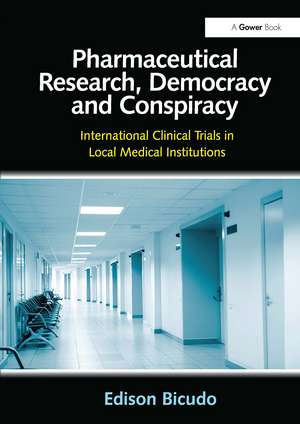Pharmaceutical Research, Democracy and Conspiracy: International Clinical Trials in Local Medical Institutions
Autor Edison Bicudoen Limba Engleză Paperback – 24 iun 2024
Preț: 207.77 lei
Preț vechi: 272.67 lei
-24% Nou
Puncte Express: 312
Preț estimativ în valută:
39.77€ • 43.21$ • 33.43£
39.77€ • 43.21$ • 33.43£
Carte tipărită la comandă
Livrare economică 21 aprilie-05 mai
Preluare comenzi: 021 569.72.76
Specificații
ISBN-13: 9781032837093
ISBN-10: 1032837098
Pagini: 192
Dimensiuni: 174 x 246 mm
Greutate: 0.35 kg
Ediția:1
Editura: Taylor & Francis
Colecția Routledge
Locul publicării:Oxford, United Kingdom
ISBN-10: 1032837098
Pagini: 192
Dimensiuni: 174 x 246 mm
Greutate: 0.35 kg
Ediția:1
Editura: Taylor & Francis
Colecția Routledge
Locul publicării:Oxford, United Kingdom
Public țintă
Professional Practice & DevelopmentCuprins
Introduction; Part One Global Trials in Medical Institutions; Chapter 1 Infrastructure: The Indirect Privatization of Hospitals; Chapter 2 Payments: Global Trials and Local Agreements; Chapter 3 Care: The Global Need for global Trials; Part Two Global Trials in the Geographical Space; Chapter 4 Communication: The Collective Design of Clinical Protocols; Chapter 5 Globalization: Clinical Trials and International Hierarchies; Chapter 6 Hope: The Symbolic Dimension of Global Trials; conclusion Conclusion;
Notă biografică
As a researcher, Edison Bicudo developed several studies in Brazilian institutions, exploring the fields of sociology, geography, politics and cultural studies. In his personal projects, he has been interested in health technologies and their impacts on the organization of society and geographical space. His previous studies focused on the production of medicines (Master�€�s Degree at the University of São Paulo, Brazil) and the biotechnological activities conducted in the European Union (Master�€�s Degree at the University Paris 1, France). In his PhD study, ethics committees and the international clinical trials sponsored by pharmaceutical companies are focused on. Drawing attention to the situations of South Africa and Brazil, Edison looks at ethics committees as institutions promoting several ideological blends. The author�€�s main theoretical framework is the theory of communicative action proposed by German sociologist Jürgen Habermas, as well as the geographical theory formulated by Brazilian geographer Milton Santos.
Recenzii
’...a richly detailed description of the contributions made on the local end of global clinical trials ... making the case for asserting democratic control over the incursions of corporations into local medical institutions. ... there is plenty to engage the interest of anyone who enjoys thinking about the ethics of global clinical trials.’ Developing World Bioethics, vol. 15, no. 1, 2015 ’Based on dozens of interviews with pharmaceutical company representatives, CRO managers, clinical trial recruiters, physicians conducting trials, as well as staff and administrators for drug trial sites... Bicudo draws attention to what he calls mediational actions, which he argues are instrumental to the success of the clinical trials enterprise because they enable the pharmaceutical industry to navigate the translation from the global to the local contexts. ... Perhaps the most interesting section is focused on the privatization of clinical trials that are conducted in state or publicly funded institutions.’ Roberto Abadie, Medical Anthropology Quarterly
Descriere
Studies of phenomena such as clinical trials usually focus on either the mechanisms involved in conducting or regulating operations at the global level, or ethical issues concerning the exploitation of individuals at the local level. In Pharmaceutical Research, Democracy and Conspiracy, Edison Bicudo examines the connections between global and loca
